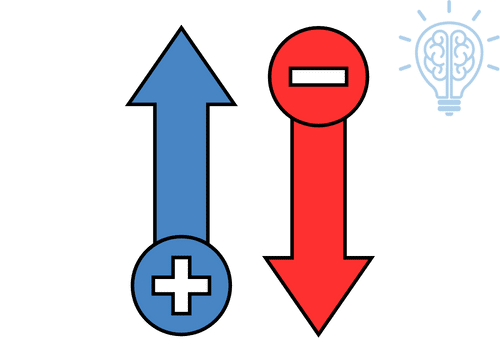What Is Negative Reinforcement?
Negative reinforcement is a behavioral principle where a behavior is strengthened by removing or avoiding an unpleasant stimulus. Unlike punishment, which aims to decrease behavior, negative reinforcement increases the likelihood of a behavior occurring again.
For example, if a student completes homework early to avoid last-minute stress, the removal of stress reinforces the habit of early completion. Similarly, wearing noise-canceling headphones to eliminate distractions encourages their continued use for better focus.
Negative Reinforcement vs. Punishment
It is often misunderstood as punishment, but they have opposite effects:
| Negative Reinforcement | Punishment |
|---|---|
| Removes an unpleasant stimulus to increase behavior. | Introduces an unpleasant stimulus to decrease behavior. |
| Example: Leaving early to avoid traffic makes someone more likely to continue leaving early. | Example: Getting a speeding ticket discourages reckless driving. |
| Encourages repeated behavior by removing discomfort. | Aims to stop unwanted behavior by adding consequences. |
Why Is Negative Reinforcement Important?
Negative reinforcement plays a crucial role in habit formation, motivation, and self-regulation. It helps:
🔄 Encourage Adaptive Behavior
By removing discomfort, individuals learn to adopt behaviors that prevent future stress or discomfort.
💡 Strengthen Problem-Solving Skills
Helps people develop strategies to avoid unpleasant experiences proactively.
⏳ Improve Time Management
People may complete tasks earlier to avoid last-minute pressure, reinforcing proactive habits.
🎯 Enhance Self-Regulation
Encourages behaviors like avoiding distractions or staying organized to prevent future difficulties.
How Negative Reinforcement Relates to Executive Function
Negative reinforcement is closely linked to executive function skills, influencing:
- Inhibitory Control: Encourages avoiding distractions to prevent negative consequences.
- Task Initiation: Reinforces starting tasks early to avoid stress.
- Self-Monitoring: Helps individuals recognize which behaviors reduce discomfort.
- Planning and Organization: Encourages structured approaches to prevent last-minute problems.
- Time Management: Promotes strategies to minimize inefficiencies and stress.
Common Challenges with Negative Reinforcement
While it can be effective, it must be applied carefully to avoid unintended consequences. Challenges include:
- ⚡ Reinforcing avoidance behaviors that do not promote long-term growth.
- ⏳ Short-term relief may discourage addressing root problems.
- 🚧 Developing reliance on avoiding discomfort instead of building resilience.
- 🔄 Overuse may lead to procrastination or passive coping strategies.
Effective Strategies for Using Negative Reinforcement
To use negative reinforcement effectively while promoting positive behaviors, consider the following strategies:
✅ 1. Pair It with Positive Reinforcement
Encourage good habits by combining negative reinforcement (removing discomfort) with positive reinforcement (rewarding effort).
✅ 2. Use It for Proactive Problem-Solving
Encourage behaviors that prevent stress rather than simply avoiding discomfort.
✅ 3. Promote Growth-Oriented Thinking
Help individuals recognize that overcoming challenges builds resilience, rather than just removing stressors.
✅ 4. Reinforce Positive Coping Strategies
Encourage strategies like planning ahead, using reminders, or setting realistic expectations.
✅ 5. Balance Avoidance with Facing Challenges
Use negative reinforcement to eliminate unnecessary stress, but also promote resilience in difficult situations.
✅ 6. Create Structured Routines
Help individuals build predictable habits that reduce unnecessary discomfort while promoting responsibility.
How Executive Function Coaching Can Help
For individuals struggling with motivation, procrastination, or avoidance behaviors, executive function coaching provides strategies to apply negative reinforcement in productive ways. Coaching can assist with:
- Identifying patterns of avoidance and replacing them with proactive strategies.
- Strengthening executive function skills to reduce reliance on negative reinforcement.
- Teaching self-monitoring techniques to recognize productive vs. unproductive avoidance.
- Developing structured routines that minimize stress without reinforcing procrastination.
By applying these approaches thoughtfully, individuals can enhance productivity, manage stress effectively, and build stronger executive function skills.
📞 Want to improve motivation and executive function? Contact us for executive function coaching today!




